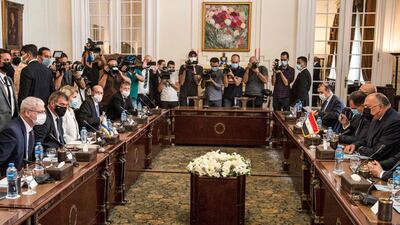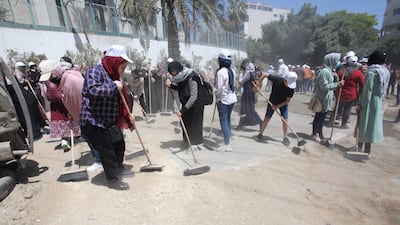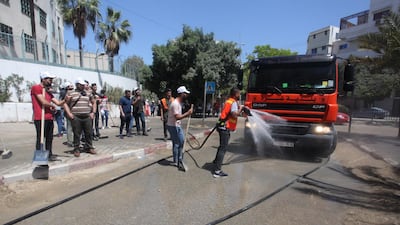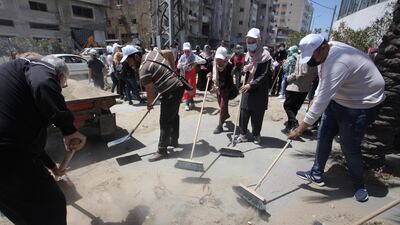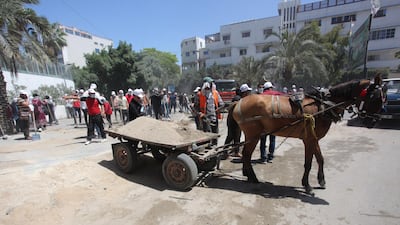Israel held talks with Egypt on Sunday to discuss a permanent truce with militants in Gaza.
Ministers met in Cairo and Jerusalem after a temporary ceasefire was agreed to on May 21.
In Cairo, Egyptian Foreign Minister Sameh Shoukry met his Israeli counterpart, Gabi Ashkenazi, as part of what his ministry said were continuing efforts to “resurrect the [Palestinian-Israeli] peace process and to build on the ceasefire in Gaza”.
Ministry spokesman Ahmed Hafez said Mr Shoukry spoke about the "necessity ... to halt practices that lead to tension and escalate confrontations".
He said Mr Shoukry told Mr Ashkenazi that "appropriate conditions" must be created for abandoned Palestinian-Israeli peace negotiations to resume urgently.
The pair also discussed plans for reconstruction in the Gaza Strip, battered by hundreds of Israeli air strikes in the 11-day conflict.
Egyptian security sources said Israel wanted guarantees that Hamas, the militant group that rules the coastal enclave, did not directly benefit from the reconstruction effort.
On arrival in Cairo, Mr Ashkenazi tweeted that he intended to discuss with Mr Shoukry a permanent ceasefire with Hamas and mechanisms for providing humanitarian aid and reconstruction to Gaza. The international community would play a “pivotal role”, he said.
In Israel, Maj Gen Abbas Kamel, head of Egypt’s General Intelligence Directorate, the country’s top spy agency, met Israeli Prime Minister Benjamin Netanyahu.
He was later due to travel to Ramallah to meet Palestinian President Mahmoud Abbas, and then on to the Gaza Strip.
Mr Netanyahu told Maj Gen Kamel of his country’s wish to see “civilians and soldiers” held in Gaza freed soon, according to the Israeli Foreign Ministry.
The two also discussed “mechanisms” to prevent Hamas bolstering its military capabilities and its use of reconstruction materials destined for Gaza, the ministry said on its Facebook page.
The Egyptian security sources, speaking on condition of anonymity, said Israel wanted any exchange of prisoners with Hamas to be part of negotiations on a permanent truce with the militant group.
Two Israeli civilians and the bodies of two Israeli soldiers killed in the 2014 Hamas-Israel war are thought to be held by Hamas.
Israel is holding several Hamas operatives in detention.
But the sources said Hamas was opposed to linking a permanent truce with a prisoner exchange. It also wanted international guarantees for a truce, as well as Israeli assurances that it would halt targeted killings of its leaders in the Gaza Strip.
Egypt in 1979 became the first Arab state to sign a peace treaty with Israel. Relations between the former enemies – they fought four wars between 1948 and 1973 – have been called a "cold peace" but the two nations have closely co-operated on security.
Mr Ashkenazi is the first Israeli foreign minister to make a public visit to Egypt in more than a decade.
Israel brands Hamas a terrorist group and does not deal with it directly, while Egypt, which borders both Gaza and Israel, has a rocky relationship with the militant group.
Egypt sees Hamas as a potential security threat and has accused it in the past of aiding militants waging an insurgency in the north of its Sinai Peninsula.
Iran’s influence in Hamas-ruled Gaza is another source of concern for Egypt.
Egypt has destroyed an elaborate, Hamas-supervised network of tunnels under its border with Gaza that had been used for years to smuggle a wide range of goods into the impoverished enclave.
However, Egypt has also repeatedly mediated between Israel and Hamas.
